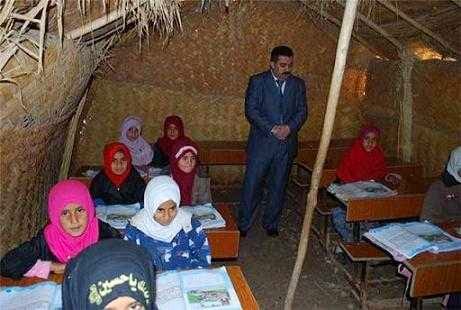It was very difficult for 40-year-old Hamama to sound out a few words from the reading material provided to her by the literacy program. She managed to read some words, yet failed to read others despite the simple text.
"I am like a completely blind woman. I know nothing," Hamama told Al-Monitor. "All I wish for is to learn how to read and write so I can read the signs in the streets and go to a doctor by myself," she added.
Hamama is one of 6 million illiterate Iraqis, according to a 2012 UNESCO report.
The Iraqi Ministry of Education supported these statistics and added that Baghdad shows the highest illiteracy figures at 2.5 million.
The Iraqi government has been working with UNESCO on a campaign to eradicate illiteracy in the country. As a first step, a law to regulate the project was issued Oct. 4, 2011.
The Iraqi parliament has also allocated a budget of 179 billion Iraqi dinars ($153.7 million) to the program. However, the Council of Ministers only approved an amount of 50 billion dinars ($42.9 million), and even this amount was not actually disbursed.
The Ministry of Finance lent the money to the Ministry of Education, which the former must return later on. This step came a year after launching the first phase of the campaign to eradicate illiteracy at the end of September 2012.
Herein lies the problem.
The government launched the campaign without providing the necessary funds. All those working in the government, including educational staff, supervisors and administrative workers, among others, have not received any of their salaries, despite that the cabinet approved the funds.
Moreover, it is worth noting that these salaries are not large sums. In fact, the highest monthly salary among those involved is 200,000 dinars ($170), paid to supervisors who follow up on the educational program and make sure it is properly carried out.
Directors earn the same salary, while teachers receive 150,000 dinars monthly, about $125.
The truth of the matter is that the campaign has only attracted 8% of the people who need it, according to the Ministry of Education.
There are 5,966 literacy centers working with 503,602 illiterate citizens out of 6 million, while the number of teachers is 36,842.
Al-Monitor visited one of the public schools that include a literacy center. The school is located in the Talibiya region, east of Baghdad.
Al-Monitor met with the headmistress and the center’s only teacher, Kawsar Mahdi.
Mahdi said that she has not been paid in nine months, since last June. She said, "I went to the Ministry of Education many times, demanding that it provide extra staff members to assist me, since the center serves 70 students.
However, officials there said there are no available teachers."
"Why haven’t we received our salaries yet? All we have is the books and teaching tools we received from UNESCO as grants. These grants, allocated to literacy centers, amounted to $1.5 million when the campaign was first launched," she added.
Through Mahdi’s account, we can clearly see that the Iraqi government did not lift a finger to make this campaign work. The literacy centers did not need to be established, because they were already part of public schools.
The supplies for the centers were provided by UNESCO, including printing the teaching curriculum. The government only had to pay the small salaries of teachers, an amount that constitutes only a small fraction of the budget allocated to the campaign.
Some young female students Al-Monitor met in the literacy centers were very eager to pursue their studies and asked if they could go to university.
Perhaps one of the weakest points of the literacy campaign is that it does not prepare students to pursue higher studies, since the certificate they receive for completing the program is equivalent to a fourth-grade education.
Although the government’s "National Campaign for Literacy" is meant to completely eradicate illiteracy, it is only teaching people the basics of reading and writing.
Layla al-Khafaji, a member of the Supreme Islamic Council, told Al-Monitor in a telephone interview that according to reports, the literacy campaign is being hindered by the delay in paying the teachers’ salaries at literacy centers.
This has pushed many teachers to quit and discouraged others from joining the campaign.
"With no teaching staff to carry out the campaign, it is doomed to failure," added Khafaji.
Khafaji, who is also a former member of parliament, fully blames the state and its institutions for this failure, saying Iraq is a rich country that could afford to allocate a portion of its budget to eradicate illiteracy.
Should literacy rates continue to drop, it will further deteriorate the country, as a great lack of awareness and culture would provide fertile soil for "terrorist groups," she said.
She added that it is only normal for the literacy campaign to fail, since the parliament’s regulatory body is non-operational and no campaign or project launched by the government will fare well.
by Amal Sakr














0 Comments